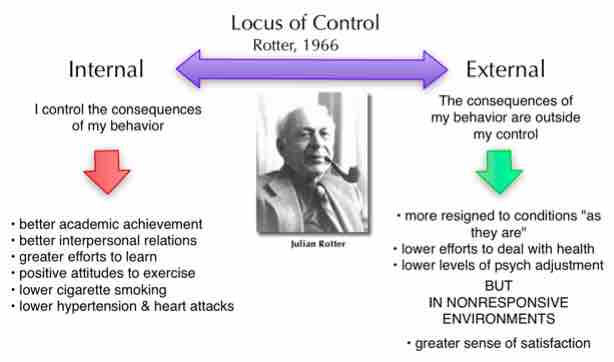Social-cognitive theories of personality emphasize the role of cognitive processes, such as thinking and judging, in the development of personality. Social cognition is basically social thought, or how the mind processes social information; social-cognitive theory describes how individuals think and react in social situations. How the mind works in a social setting is extremely complicated—emotions, social desirability factors, and unconscious thoughts can all interact and affect social cognition in many ways. Two major figures in social cognitive-theory are behaviorist Albert Bandura and clinical psychologist Julian Rotter.
Albert Bandura (1925-present)
Albert Bandura is a behavioral psychologist credited with creating social learning theory. He agreed with B.F. Skinner's theory that personality develops through learning; however, he disagreed with Skinner’s strict behaviorist approach to personality development. In contrast to Skinner’s idea that the environment alone determines behavior, Bandura (1990) proposed the concept of reciprocal determinism, in which cognitive processes, behavior, and context all interact, each factor simultaneously influencing and being influenced by the others. Cognitive processes refer to all characteristics previously learned, including beliefs, expectations, and personality characteristics. Behavior refers to anything that we do that may be rewarded or punished. Finally, the context in which the behavior occurs refers to the environment or situation, which includes rewarding/punishing stimuli.
Reciprocal determinism
Bandura proposed the idea of reciprocal determinism, in which our behavior, cognitive processes, and situational context all influence each other.
This theory was significant because it moved away from the idea that environment alone affects an individual's behavior. Instead, Bandura hypothesized that the relationship between behavior and environment was bi-directional, meaning that both factors can influence each other. In this theory, humans are actively involved in molding the environment that influences their own development and growth.
Julian Rotter (1916-present)
Julian Rotter is a clinical psychologist who was influenced by Bandura's social learning theory after rejecting a strict behaviorist approach. Rotter expanded upon Bandura's ideas of reciprocal determinism, and he developed the term locus of control to describe how individuals view their relationship to the environment. Distinct from self-efficacy, which involves our belief in our own abilities, locus of control refers to our beliefs about the power we have over our lives, and is a cognitive factor that affects personality development. Locus of control can be classified along a spectrum from internal to external; where an individual falls along the spectrum determines the extent to which they believe they can affect the events around them.

Locus of control
Rotter's theory of locus of control places an individual on a spectrum between internal and external.
Internal Locus of Control
A person with an internal locus of control believes that their rewards in life are guided by their own decisions and efforts. If they do not succeed, they believe it is due to their own lack of effort. An internal locus of control has been shown to develop along with self-regulatory abilities. People with an internal locus of control tend to internalize both failures and successes.
Many factors have been associated with an internal locus of control. Males tend to be more internal than females when it comes to personal successes—a factor likely due to cultural norms that emphasize aggressive behavior in males and submissive behavior in females. As societal structures change, this difference may become minimized. As people get older, they tend to become more internal as well. This may be due to the fact that as children, individuals do not have much control over their lives. Additionally, people higher up in organizational structures tend to be more internal. Rotter theorized that this trait was most closely associated with motivation to succeed.
External Locus of Control
A person with an external locus of control sees their life as being controlled by luck, chance, or other people—especially others with more power than them. If they do not succeed, they believe it is due to forces outside their control. People with an external locus of control tend to externalize both successes and failures. Individuals who grow up in circumstances where they do not see hard work pay off, as well as individuals who are socially disempowered (such as people in a low socioeconomic bracket), may develop an external locus of control. An external locus of control may relate to learned helplessness, a behavior in which an organism forced to endure painful or unpleasant stimuli becomes unable or unwilling to avoid subsequent encounters with those stimuli, even if they are able to escape.
Evidence has supported the theory that locus of control is learned and can be modified. However, in a non-responsive environment, where an individual actually does not have much control, an external locus of control is associated with a greater sense of satisfaction.
Examples of locus of control can be seen in students. A student with an internal locus of control may receive a poor grade on an exam and conclude that they did not study enough. They realize their efforts caused the grade and that they will have to try harder next time. A student with an external locus of control who does poorly on an exam might conclude that the test was poorly written and the teacher was incompetent, thereby blaming external factors out of their control.